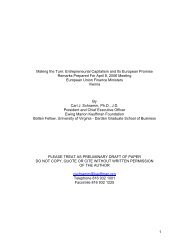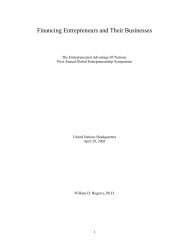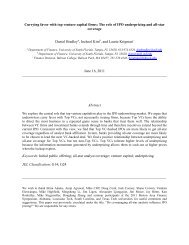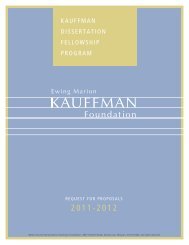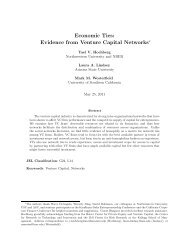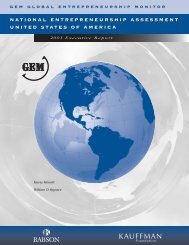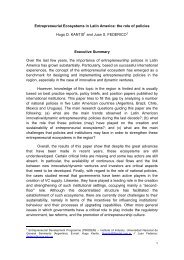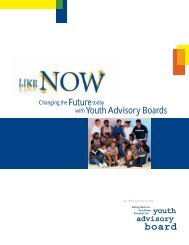Financing Child Care in the United States - Ewing Marion Kauffman ...
Financing Child Care in the United States - Ewing Marion Kauffman ...
Financing Child Care in the United States - Ewing Marion Kauffman ...
You also want an ePaper? Increase the reach of your titles
YUMPU automatically turns print PDFs into web optimized ePapers that Google loves.
ALLOCATING PUBLIC REVENUES EDUCATION<br />
COMMUNITY PARTNERSHIPS FOR<br />
CHILDREN (MASSACHUSETTS)<br />
DESCRIPTION<br />
Community Partnerships for <strong>Child</strong>ren (CPC) is a statefunded<br />
program of <strong>the</strong> Massachusetts Department of<br />
Education (DOE) designed to provide comprehensive,<br />
high-quality programs for preschool-aged children and<br />
<strong>the</strong>ir families. A Community Partnership Council,<br />
composed of agencies and families <strong>in</strong> a community or<br />
group of communities, plans and implements a local<br />
system of preschool programs and services. The goal is<br />
to <strong>in</strong>crease <strong>the</strong> availability, affordability and quality of<br />
programs that respond to <strong>the</strong> needs of work<strong>in</strong>g parents<br />
and that enhance children’s learn<strong>in</strong>g and healthy<br />
development<br />
WHEN ESTABLISHED<br />
The orig<strong>in</strong>al program began <strong>in</strong> 1986 as part of <strong>the</strong> Public<br />
School Improvement Act of 1985. It was modified and<br />
became Community Partnerships for <strong>Child</strong>ren when<br />
additional funds were appropriated for FY1993.<br />
ANNUAL AMOUNT<br />
The total amount available for FY1999 was $79.5 million,<br />
for FY2000 <strong>the</strong> amount available was $94.5 million, and<br />
<strong>the</strong> amount available will rise to $99.5 million <strong>in</strong> FY2001.<br />
Each city or town <strong>in</strong> Massachusetts is eligible for a share<br />
of <strong>the</strong> fund<strong>in</strong>g, rang<strong>in</strong>g from a m<strong>in</strong>imum of $11,893 for<br />
<strong>the</strong> smallest towns to <strong>the</strong> allocation for <strong>the</strong> City of<br />
Boston, which was $2.4 million for FY2000. Statewide,<br />
at least $2 million must be contracted to Head Start<br />
programs. CPC is funded with general revenue with<strong>in</strong><br />
<strong>the</strong> DOE budget.<br />
SERVICES FUNDED<br />
Each city or town must establish a CPC Council, which<br />
develops a plan and application for fund<strong>in</strong>g based on a<br />
community needs assessment. A variety of services may<br />
be funded <strong>in</strong> addition to child care and early education<br />
services to preschool children. These services <strong>in</strong>clude:<br />
tra<strong>in</strong><strong>in</strong>g and technical assistance to providers of early<br />
care and education (<strong>in</strong>clud<strong>in</strong>g scholarships and<br />
professional development programs); comprehensive<br />
programs and services (such as social, health and<br />
nutrition services, family education and family literacy),<br />
and capital projects to improve exist<strong>in</strong>g space or expand<br />
capacity to serve preschoolers.<br />
Direct preschool services must operate at least 2.5 hours<br />
per day for at least three days per week dur<strong>in</strong>g <strong>the</strong><br />
school year. There is strong emphasis on serv<strong>in</strong>g work<strong>in</strong>g<br />
families, so many programs operate full-day year-round.<br />
Statewide, at least one-third of children served by CPC<br />
funds must be <strong>in</strong> full-day, full-year programs. Parents are<br />
required to contribute to <strong>the</strong> cost of care based on a<br />
slid<strong>in</strong>g fee scale.<br />
All CPC-funded programs must have or seek<br />
accreditation from <strong>the</strong> National Academy of Early<br />
<strong>Child</strong>hood Programs (i.e. <strong>the</strong> accreditation arm of <strong>the</strong><br />
National Association for <strong>the</strong> Education of Young<br />
<strong>Child</strong>ren). Family child care providers must have or seek a<br />
<strong>Child</strong> Development Associate credential or accreditation<br />
by <strong>the</strong> National Association for Family <strong>Child</strong> <strong>Care</strong>. CPCfunded<br />
programs <strong>in</strong> public schools must meet<br />
Massachusetts DOE preschool standards. Head Start,<br />
private child care and family child care programs must be<br />
licensed.<br />
HOW FUNDS DISTRIBUTED<br />
CPC funds are allocated to each city and town us<strong>in</strong>g<br />
a formula based on <strong>the</strong> number of resident 3– and<br />
4–year–olds and <strong>the</strong> percentage of work<strong>in</strong>g families<br />
earn<strong>in</strong>g less than 75 percent of <strong>the</strong> state median <strong>in</strong>come.<br />
These factors are used to determ<strong>in</strong>e a base amount per<br />
child, with an additional amount per low-<strong>in</strong>come child.<br />
CPC funds are grants, subject to review by <strong>the</strong><br />
Department of Education (DOE) and outside reviewers.<br />
The DOE may accept, reject or return an application for<br />
revisions.<br />
To access CPC fund<strong>in</strong>g, a community (one city or town)<br />
or a group of communities (several geographically<br />
connected cities and towns) must establish a CPC<br />
Council. The CPC Council selects one lead agency which<br />
submits <strong>the</strong> application to <strong>the</strong> DOE. The lead agency may<br />
be a public school district, a Head Start agency or a<br />
licensed child care agency. The lead agency subcontracts<br />
for services with local agencies. Head Start programs,<br />
private child care programs, public school preschools,<br />
community agencies and family child care providers are<br />
encouraged to participate, and all may apply to serve<br />
children with CPC funds.<br />
The community CPC Council is <strong>the</strong> heart of CPC. The<br />
Council represents <strong>the</strong> community(ies) <strong>in</strong> <strong>the</strong> partnership<br />
and develops <strong>the</strong> plan for expand<strong>in</strong>g and improv<strong>in</strong>g<br />
preschool education and maximiz<strong>in</strong>g <strong>the</strong> use of exist<strong>in</strong>g<br />
resources. By statute, n<strong>in</strong>e members are required: one<br />
public school pr<strong>in</strong>cipal; three providers of early care and<br />
education to young children (i.e. teachers or family child<br />
care providers); two parents of young children; one<br />
representative from <strong>the</strong> local child care resource and<br />
referral agency, one representative from <strong>the</strong> local Head<br />
Start agency and one private provider of child care (e.g., a<br />
nursery school, religious preschool program, nonprofit or<br />
proprietary child care center or family child care provider).<br />
The DOE fur<strong>the</strong>r requires at least one family child care<br />
provider and two additional community members who are<br />
not providers. If <strong>the</strong> Council represents more than one<br />
community, it must <strong>in</strong>clude at least one parent, one<br />
teacher and one adm<strong>in</strong>istrator from each community.<br />
83





